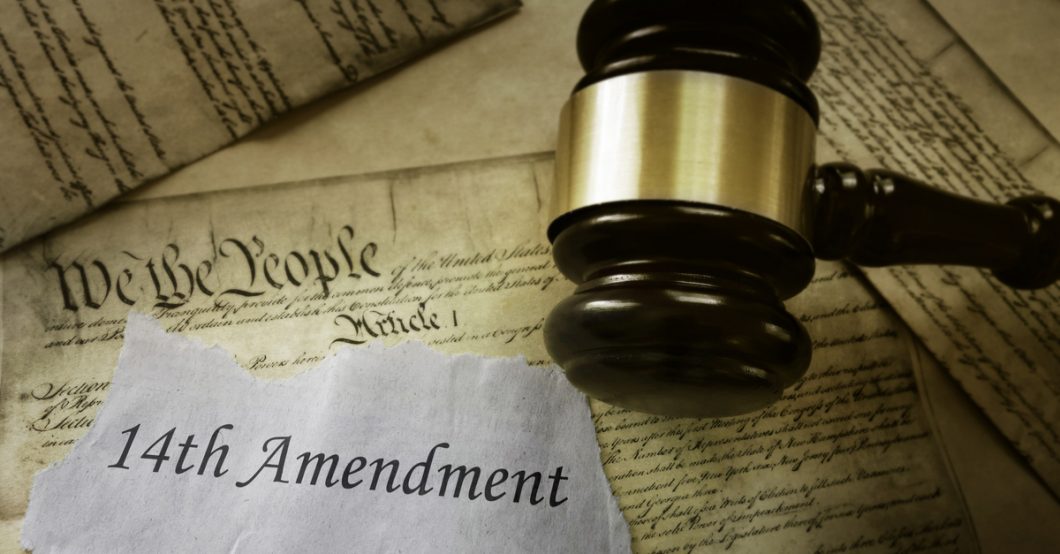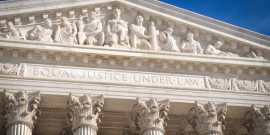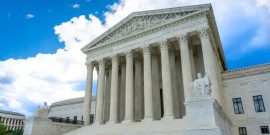The argument made recently by Kim Forde-Mazrui may not be in good faith, but it does raise important questions about the meaning of the Constitution.
The Privileges or Immunities Clause and Unenumerated Rights
In a recent essay at American Greatness, Mark Pulliam took the Supreme Court and libertarian constitutional scholars to task for supporting the doctrine of substantive due process and the concept of unenumerated constitutional rights. Pulliam in particular objects to the efforts of what he calls “false” originalists to reverse the Supreme Court’s holding in The Slaughterhouse Cases[1] and resurrect the long-ignored Privileges or Immunities Clause of the Fourteenth Amendment as a source of unenumerated constitutional rights. In a response posted in this space, Professor Mike Rappaport insists that “[t]he Slaughterhouse Cases misinterpreted the Privileges or Immunities Clause of the Fourteenth Amendment” and that “[v]irtually every legal scholar, no matter of what viewpoint, believes the majority opinion in this case was mistaken.”
It is because of scholars like myself that Rappaport cannot write every legal scholar believes Slaughterhouse was mistaken. In fact, the historical record strongly suggests that Justice Miller was correct to lead a majority in Slaughterhouse to reject the idea that the Privileges or Immunities Clause protects unenumerated absolute rights. Pulliam is absolutely right to question the originalist reasoning of those scholars who wish to reverse Slaughterhouse and open the door to judicial construction and enforcement of unenumerated rights, natural or otherwise. But Pulliam is wrong to further suggest that the Court erred in incorporating the Bill of Rights against the states. Although the Supreme Court has been wrong to enforce that doctrine under the Due Process Clause, it would be entirely right to do so under the Privileges or Immunities Clause. Further, doing so would not require reversing Slaughterhouse or open the door to judicial construction of unenumerated rights.
The man who drafted the Privileges or Immunities Clause, John Bingham, could not have been clearer about his desire to enforce the Bill of Rights against the States. On February 28, 1866, when John Bingham submitted his first draft of the Privileges or Immunities Clause, he declared, “[t]he proposition pending before the House is simply a proposition to arm the Congress of the United States, by the consent of the people of the United States, with the power to enforce the bill of rights as it stands in the Constitution to-day. It “hath that extent—no more.”[2] On March 9th, Bingham again declared that “the enforcement of the bill of rights [against the states] is the want of the Republic.”[3] On May 10, following the submission of Bingham’s final draft, once again Bingham declared “There was a want hitherto, and there remains a want now, in the Constitution of our country, which the proposed amendment will supply.”[4] The Privileges or Immunities Clause would finally allow congress to enforce provisions like the eighth amendment’s protection against cruel and unusual punishments. Once again, Bingham assured his colleagues, “That is the extent that it hath, no more.”[5] Finally, in 1871, Bingham explained:
Jefferson well said of the first eight articles of amendments to the Constitution of the United States, they constitute the American Bill of Rights. . . . They secured . . . all the rights dear to the American citizen. And yet it was decided, and rightfully, that these amendments, defining and protecting the rights of men and citizens, were only limitations on the power of Congress, not on the power of the States. . . .
Mr. Speaker, this House may safely follow the example of the makers of the Constitution and the builders of the Republic, by passing laws for enforcing all the privileges and immunities of citizens of the United States, as guarantied by the amended Constitution and expressly enumerated in the Constitution.”[6]
This was Bingham’s vision—a vision embodied in the text he drafted and presented to Congress and the public. The rights of American citizenship, the privileges or immunities of citizens of the United States, were those rights “expressly enumerated in the Constitution,” which prior to the adoption of the fourteenth amendment “were only limitations on the power of Congress, not on the power of the States.” As Texas Judge and Constitutional Treatise writer George Paschal wrote only one week after the Secretary of State declared the ratification of the Fourteenth Amendment, “anyone doubting the tremendous importance of the amendment “should know that the national bill of rights has, by a common error, been construed not to apply to or control the States.” This is what the amendment was meant to change.
Nothing in Justice Miller’s opinion in Slaughterhouse contradicts the idea that the “privileges or immunities of citizens of the United States” include the rights enumerated in the 1791 amendments to the Constitution. The case involved nothing more than whether the Privileges or Immunities Clause protected the unenumerated right to pursue a trade (the slaughterhouse trade in that case). To the degree that Miller said anything else about the scope of the Clause, it was no more than dicta. But, in fact, Miller expressly included rights enumerated in the First Amendment as the privileges or immunities of national citizenship. According to Miller, “[t]he right to peaceably assemble and petition for redress of grievances, the privilege of the writ of habeas corpus, are rights of the citizen guaranteed by the Federal Constitution.”[7]
Miller’s inclusion of the rights of habeas corpus is telling. The privileges or immunities of citizens of the United States include all enumerated rights. As John Bingham himself explained, this “chiefly” involves those listed in the Bill of Rights, but it also includes other constitutionally enumerated rights, such as the rights of habeas corpus listed in Article I, Section 9, and the equal rights of traveling citizens enumerated in Article IV, Section 2 (the Comity Clause). When Jacob Howard introduced the Privileges or Immunities Clause to the Senate, he also listed only enumerated rights, but included both those listed in the first eight amendments as well as the equal treatment rights of Article IV, Section 2.
Miller seemed to believe that the enumerated rights of national citizenship included both those enumerated in the Constitution and those established by Congress under their enumerated powers and protected against state interference by the Supremacy Clause (congressional power to regulate interstate waterways, for example). But this theory does not in any way call into question the idea that the Privileges or Immunities Clause has the effect of binding the states to respect the personal rights listed in the Bill of Rights. It is time that Slaughterhouse be delivered from the accusation that it killed the incorporation of the Bill of Rights. It did not. That dubious privilege belongs to the odious case of United States v. Cruikshank (1876), where the court ruled the Bill of Rights did not bind the states and, in doing so, cited Barron v. Baltimore (not Slaughterhouse).
But what of unenumerated rights? Would not applying the Bill of Rights against the states have the effect of applying the Ninth Amendment against the states? And does not this amendment declare that there are “other rights” beyond those enumerated in the constitution?
Scholarship on the Ninth Amendment is broad and deep, as are the various theories regarding its meaning. Suffice it to say for now that when John Bingham and Jacob Howard listed the enumerated rights now enforceable against the states by the Privileges or Immunities Clause, they named those listed in the first eight amendments. It seems fairly obvious why they left the Tenth Amendment off the list: This is an amendment understood at the time, as it is now, as a text declaring the principle of constitutional federalism and the reserved right of the people in the several states to retain control over all “powers not delegated” to the national government. What scholars often fail to recognize, however, is that at the time of Reconstruction, both the Ninth and Tenth Amendments were regarded as provisions declaring the reserved powers and rights of the people in the several states.
Since the moment of its ratification, the Ninth Amendment was associated with the reserved right of the people to local self-government. This is how James Madison described the Ninth and Tenth Amendments in his speech opposing the original Bank of the United States. This is also how the Ninth and Tenth Amendments were described throughout the antebellum period. In fact, by the time Congress debated the Fourteenth Amendment, the Ninth Amendment had been wielded in support of some of the most “pernicious” doctrines of state rights.
In the original debates on the admission of Missouri, proponents of slavery insisted the Ninth and Tenth Amendments prevented Congress from banning slavery in the territory.[8] In his concurring opinion in Dred Scott v. Sanford,[9] Justice John A. Campbell declared that “the ninth and tenth amendments to the Constitution were designed to include the reserved rights of the States, and the people.”[10] In his speech supporting South Carolina’s secession from the Union, Democrat Judah P. Benjamin quoted the Ninth and Tenth Amendments as “an important addition made to the Constitution by which it was expressly provided that it should not be construed to be a General Government over all the people, but that it was a Government of States. . . . The language of the ninth and tenth amendments to the Constitution is susceptible of no other construction.”[11] In his speech opposing the Thirteenth Amendment, New York’s Fernando Wood declared “[t]he control over slavery, and the domestic and social relations of the people of the respective States, was not and never was intended to be delegated to the United States, and cannot now be delegated except by the consent of all the States. Articles nine and ten of the Amendments to the Constitution are conclusive on this point.”[12] In the Thirty-Ninth Congress, Pennsylvania Democrat Benjamin M. Boyer opposed Section Two of the Fourteenth Amendment and quoted the Ninth and Tenth Amendments as evidence that Congress had no right to “disfranchise the majority of the citizens of any State on account of their past participation in the rebellion.”[13] This practice of linking the Ninth Amendment to the rights of the states continued after the Thirty-Ninth Congress. In the Fortieth Congress, opponents of the 1870 Enforcement Act insisted that its passage violated the state rights principles of the Ninth and Tenth Amendments.[14]
In short, there is good reason why John Bingham and Jacob Howard would leave the Ninth Amendment off their list of personal rights protected by the Privileges or Immunities Clause. This amendment was not understood as a fount of unenumerated personal rights. It, like the Tenth Amendment, represented a declaration of the reserved powers and rights of the people in the several states. Efforts to rely on the Ninth Amendment as somehow supporting an unenumerated rights reading of the Privileges or Immunities Clause cannot be supported in light of the actual historical evidence.
In conclusion, Mark Pulliam is quite right to object to efforts to reverse Slaughterhouse and read the Privileges or Immunities Clause as authorizing judicial construction and enforcement of unenumerated rights. The Clause does nothing more than protect the enumerated rights of national citizenship, rights enumerated in the Constitution. But he is wrong to suggest that this does not support the incorporation of the Bill of Rights. This was the declared goal of the man who drafted the Privileges or Immunities Clause. It is time the Supreme Court recognize this historical fact and place incorporation where it belongs.
[1] 83 U.S. 36 (1872)
[2] Cong. Globe, 39th Cong., 1st Sess., 1087-95 (February 28, 1866).
[3] Cong. Globe, 39th Cong., 1st Sess., 1290–96 (March 9, 1866).
[4] Cong. Globe, 39th Cong., 1st Sess., 2530–45 (May 10, 1866).
[5] Id.
[6] Cong. Globe, 42d Cong. 1st Sess., Appendix, 81-86 (March 31, 1871).
[7] Slaughterhouse Cases, 83 U.S. 36, 79 (1872).
[8] See Annals of Cong., 15th Cong., 2d sess. 1197 (February 1819) (Remarks of Mr. Scott from Missouri).
[9] 60 U.S. 393 (1857).
[10] Dred Scott, 60 U.S. at 511.
[11] Cong. Globe, 36th Cong., 2nd Sess., 212-17 (December 31, 1860).
[12] Cong. Globe, 38th Cong. 1st Sess., 2941 (June 14, 1864).
[13] Cong. Globe, 39th Cong., 1st Sess., 2467 (May 8, 1866).
[14] See Cong. Globe, 41st Cong., 2d. Sess., appx. 354 (May 18, 1870) (statement of Sen. Hamilton) (citing the Ninth and Tenth amendments together as establishing the principle of enumerated federal power and protecting the reserved sovereignty of the states); id. at app’x 431 (May 27, 1870) (statement of Rep. Swan) (same).


